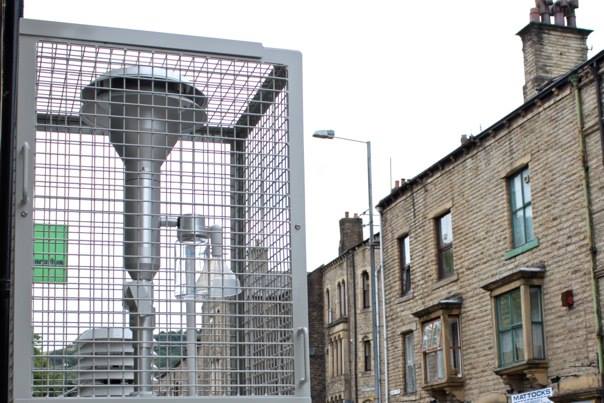An air quality monitoring contraption has popped up on Market Street outside the Hebden Bridge Coop.
This is in one of Calderdale’s seven Air Quality Management Areas, where traffic- caused air pollution exceeds legal limits for Nitrogen Dioxide (NO2) and Particulate Matter (PMn).
Calderdale Council’s Director of Public Health says air pollution is responsible for approximately 180 deaths per year in Calderdale – second only to smoking as the leading cause of death in our area.
If Calderdale Council doesn’t manage to bring air pollution in these Areas within legal limits, it faces possible massive fines from the EU. But this situation has dragged on for some time, with nothing being done because of the Council’s lack of money, due to central government cuts to local authority grants.
Now Calderdale Council supports the introduction of a West Yorkshire low emission strategy
Calderdale Council’s Director of Public Health, Paul Butcher, will soon confirm local arrangements for public consultation on the draft West Yorkshire Low Emission Strategy. He presented the draft to Calderdale Health and Wellbeing Board last week and all the member organisations supported it. The public consultation on the draft strategy will let people make comments before it’s finalised for approval by individual Councils and the West Yorkshire Combined Authority.
Key elements of the West Yorkshire Low Emissions Strategy are:
- The Single Transport Plan and Strategic Economic Plans developed by WYCA; Local Development Plans produced by Planning Authorities; and Carbon Management, Procurement and Commissioning of Services
- Local authorities to use a new Air Quality & Planning Technical Guide to assess the air quality impact from new developments, work out how to mitigate this and help shape new developments – for example by creating electric charging infrastructure.
- Changing people’s behaviour by providing other travel options and journey planning, with active travel (walking and cycling) being increasingly important.
- Discourage purchase diesel cars by raising awareness that they can produce 22 times more particulate exhaust emissions and four times more NOx emissions than petrol cars. The rise in numbers of diesel cars is one of the reasons why air quality targets have not been achieved across the UK)
- Low Emission Zone feasibility studies have been carried out for Leeds and Bradford and these are considered in the WYLES.They are an option for regulatory control if voluntary measures fail to achieve the aims of this Strategy.
- Local authorities’ fleets should switch to low emission vehicles.
- Local authorities will encourage contractors and service providers to reduce their emissions when awarding contracts.
- Support the growth of ultra-low emission fuels and technologies in the region and work out what the barriers are to Ultra Low Emissions Vehicle (ULEV) uptake, in order to make low emission vehicles a viable and affordable alternative. Less than 0.05% of cars in West Yorkshire are ULEVs.
- Support bus operators to accelerate bus replacement programmes to get old diesel buses off the road; operate newer, cleaner buses in urban areas; fit NOx and particulate abatement technology on buses; and consider low emission alternatives in order to reduce emissions from buses.
- Support the electrification or more train routes in the region and reduce the reliance on diesel engine trains.
- Support the commercial sector to reduce emissions from their fleet operations.
- Encourage and support taxi and private hire operators to switch to low emission alternatives and consider what policy incentives will support taxi and private hire operators to make the change.
- Raise awareness of emissions from non-transport sources that make air pollution worse, such as initiatives intended to reduce CO2 emissions like Combined Heat & Power and District Heating schemes and biomass or wood burning, and promote sustainable energy and heat production that don’t have an adverse impact on air quality

